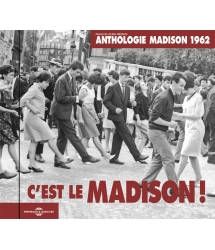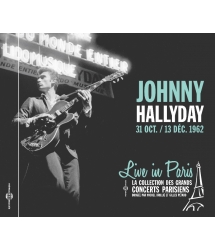- Notre Catalogue
- Philosophie
- Philosophes du XXème siècle et d'aujourd'hui
- Histoire de la philosophie (PUF)
- Contre-Histoire et Brève encyclopédie par Michel Onfray
- L'œuvre philosophique expliquée par Luc Ferry
- La pensée antique
- Les penseurs d'hier vus par les philosophes d'aujourd'hui
- Textes philosophiques historiques interprétés par de grands comédiens
- Histoire
- Livres
- Sciences Humaines
- Paroles historiques
- Livres audio & Littérature
- Notre Catalogue
- Jazz
- Blues - R'n'B - Soul - Gospel
- Rock - Country - Cajun
- Chanson française
- Musiques du monde
- Afrique
- France
- Québec / Canada
- Hawaï
- Antilles
- Caraïbes
- Cuba & Afro-cubain
- Mexique
- Amérique du Sud
- Tango
- Brésil
- Tzigane / Gypsy
- Fado / Portugal
- Flamenco / Espagne
- Yiddish / Israël
- Chine
- Tibet / Népal
- Asie
- Océan indien / Madagascar
- Japon
- Indonésie
- Océanie
- Inde
- Bangladesh
- URSS / Chants communistes
- Musiques du monde / Divers
- Musique classique
- Compositeurs - Musiques de film - B.O.
- Sons de la nature
- Notre Catalogue
- Jeunesse
- Philosophie
- Nouveautés
- Comment commander ?
- Recevoir le catalogue
- Manifeste
- Dictionnaire
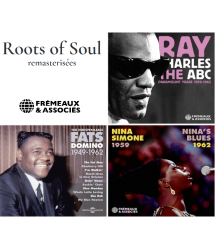

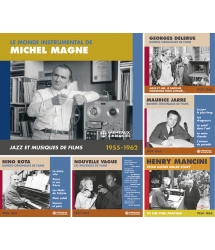








- Notre Catalogue
- Philosophie
- Philosophes du XXème siècle et d'aujourd'hui
- Histoire de la philosophie (PUF)
- Contre-Histoire et Brève encyclopédie par Michel Onfray
- L'œuvre philosophique expliquée par Luc Ferry
- La pensée antique
- Les penseurs d'hier vus par les philosophes d'aujourd'hui
- Textes philosophiques historiques interprétés par de grands comédiens
- Histoire
- Livres
- Sciences Humaines
- Paroles historiques
- Livres audio & Littérature
- Notre Catalogue
- Jazz
- Blues - R'n'B - Soul - Gospel
- Rock - Country - Cajun
- Chanson française
- Musiques du monde
- Afrique
- France
- Québec / Canada
- Hawaï
- Antilles
- Caraïbes
- Cuba & Afro-cubain
- Mexique
- Amérique du Sud
- Tango
- Brésil
- Tzigane / Gypsy
- Fado / Portugal
- Flamenco / Espagne
- Yiddish / Israël
- Chine
- Tibet / Népal
- Asie
- Océan indien / Madagascar
- Japon
- Indonésie
- Océanie
- Inde
- Bangladesh
- URSS / Chants communistes
- Musiques du monde / Divers
- Musique classique
- Compositeurs - Musiques de film - B.O.
- Sons de la nature
- Notre Catalogue
- Jeunesse
- Philosophie
- Nouveautés
- Comment commander ?
- Recevoir le catalogue
- Manifeste
- Dictionnaire
VERSIONS ORIGINALES ET VERSIONS FRANÇAISES DE LA NAISSANCE DU YÉYÉ
ARTISTES DIVERS
Ref.: FA5669
Direction Artistique : FRANCOIS JOUFFA ET PIERRE LAYANI
Label : Frémeaux & Associés
Durée totale de l'œuvre : 2 heures 51 minutes
Nbre. CD : 3
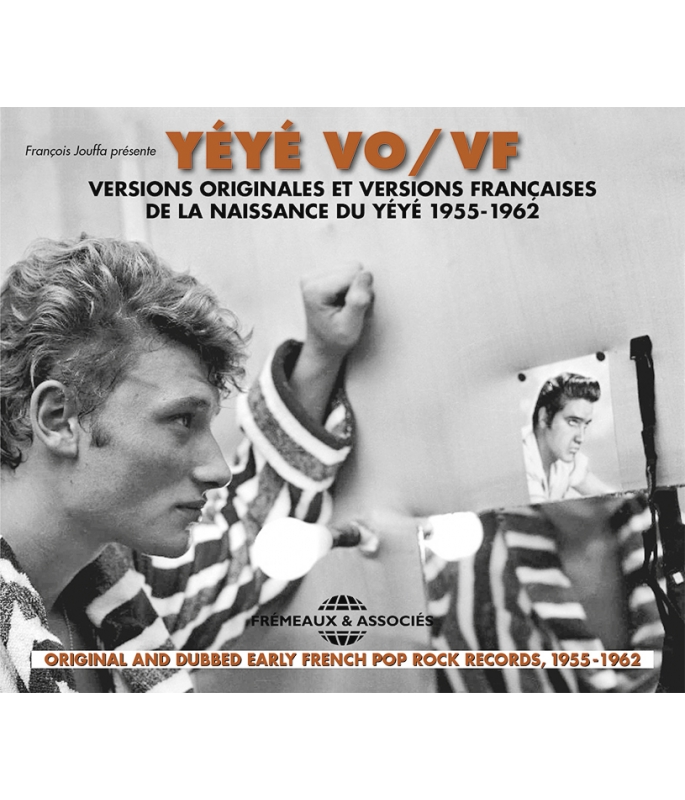
VERSIONS ORIGINALES ET VERSIONS FRANÇAISES DE LA NAISSANCE DU YÉYÉ
Même si cela avait démarré dès la fin des années 50, l’apparition du rock en France en 1960-61, importé des Etats- Unis, instaure une pratique courante de la reprise, ou adaptation. Johnny Hallyday, Richard Anthony, Sylvie Vartan et tous les groupes de rock se plient à cet exercice. Mais le N°1 américain n’est pas forcément N°1 français, et vice-versa. Et certaines versions sont transfigurées, presque des re-créations, et n’en dégagent que plus de saveur. En voici un panorama sur 3 CD, qui de 1955 à 1962 met en perspectives les titres principalement américains et français, avec des VO quasi-inconnues, réalisé par François Jouffa et Pierre Layani.
Patrick FRÉMEAUX
ORIGINAL AND DUBBED EARLY FRENCH POP ROCK RECORDS, 1955-1962
Even if they already existed before the end of the Fifties, French imports of American rock soon gave rise to the common practise known as a “reprise” or adaptation, an exercise that had many adepts including Johnny Hallyday, Richard Anthony and Sylvie Vartan, and all the rock groups. But being “N°1 in America” didn’t necessarily produce a French N°1, or vice versa, and some of the reprises were trans gured to become practically new inventions, and they were all the tastier for it. This 3CD overview taking in the years 1955-1962 puts mostly American and French titles in perspective thanks to some almost totally unknown original versions, selected here by François Jouffa and Pierre Layani. Patrick Frémeaux
DIRECTION ARTISTIQUE : FRANÇOIS JOUFFA ET PIERRE LAYANI
DROITS : DP / FREMEAUX & ASSOCIES.
CD 1 : ÉDITH PIAF L’HOMME À LA MOTO • CHEERS BLACK DENIM TROUSERS AND MOTORCYCLE BOOTS • MAC-KAC T’ES PAS TOMBÉ SUR LA TÊTE • BILL HALEY SEE YOU LATER ALLIGATOR • IRÈNE MCNEIL ROCK A BEATIN’ BOOGIE • BILL HALEY ROCK-A-BEATIN’ BOOGIE • DALIDA LA CHANSON D’ORPHÉE • JOÀO GILBERTO MANHÀ DE CARNAVAL • RICHARD ANTHONY NOUVELLE VAGUE • COASTERS THREE COOL CATS • JOHNNY HALLYDAY SOUVENIRS, SOUVENIRS • BARBARA EVANS SOUVENIRS • JOHNNY HALLYDAY KILI WATCH • COUSINS KILI WATCH • CHAUSSETTES NOIRES (AVEC EDDY MITCHELL) TU PARLES TROP • JOE JONES YOU TALK TOO MUCH • JOHNNY HALLYDAY MON SEPTIÈME CIEL • SAL MINEO SEVEN STEPS TO LOVE • CHAT SAUVAGES (AVEC DICK RIVERS) MA P’TITE AMIE EST VACHE • ELVIS PRESLEY MEAN WOMAN BLUES • CHATS SAUVAGES (AVEC DICK RIVERS) LE JOUR J • BOBBY DOSS I’VE GOT YOU (WHERE I WANT YOU) • CHAUSSETTES NOIRES AVEC EDDY MITCHELL CHÉRIE OH CHÉRIE • PINGOUINS (AVEC LOU VINCENT) OH, LES FILLES ! • HANK BALLARD SUGAREE.
CD 2 : JOHNNY HALLYDAY MON AMOUR OUBLIÉ • TEDDY BEARS OH ! WHY • CHAUSSETTES NOIRES (AVEC EDDY MITCHELL) LA BAMBA ROCK • RITCHIE VALENS LA BAMBA • FRANKIE JORDAN & SYLVIE VARTAN PANNE D’ESSENCE • FLOYD ROBINSON OUT OF GAS • DANNY BOY & SES PÉNITENTS C’EST ENCORE UNE SOURIS • ADRIANO CELENTANO CIAO TI DIRO • PIRATES (AVEC DANY LOGAN) TU METS LE FEU • JERRY LEE LEWIS GREAT BALLS OF FIRE • CHATS SAUVAGES (AVEC DICK RIVERS) TWIST À SAINT-TROPEZ • GUY LAFITTE TWIST À SAINT TROPEZ • CHATS SAUVAGES AVEC DICK RIVERS TWIST TWIST • CHAKACHAS TWIST TWIST • CHATS SAUVAGES (AVEC DICK RIVERS) OH ! BABY TU ME RENDS FOU • CLIFF BENNETT I’M IN LOVE WITH YOU • JOHNNY HALLYDAY NOUS, QUAND ON S’EMBRASSE • JERRY LEE LEWIS HIGH SCHOOL CONFIDENTIAL • RICHARD ANTHONY VEILLE BIEN SUR MON AMOUR • BOBBY VEE TAKE GOOD CARE OF MY BABY • HUGUES AUFRAY SANTIANO • HIGHWAYMEN SANTIANO • CLAUDE FRANÇOIS BELLES ! BELLES ! BELLES ! • EDDIE HODGES GIRLS, GIRLS, GIRLS (MADE TO LOVE) • EVERLY BROTHERS GIRLS, GIRLS, GIRLS (MADE TO LOVE).
CD 3 : JOHNNY HALLYDAY SERRE LA MAIN D’UN FOU • TITUS TURNER SHAKE THE HAND OF A FOOL • PINGOUINS AVEC LOU VINCENT ET BIEN, CHERCHE ! • COASTERS SEARCHIN’ • VAUTOURS (AVEC VIC LAURENS) BE BOP BOOGIE BOY • GENE VINCENT BE BOP BOOGIE BOY • ROCKERS JE SUIS PRÈS DE TOI • JOHNNY KIDD SO WHAT • EL TORO & LES CYCLONES (GUITARE : JACQUES DUTRONC) VINGTIÈME ÉTAGE • EDDIE COCHRAN TWENTY FLIGHT ROCK • LONG CHRIS MA VERTE PRAIRIE • CLIFF RICHARD EVERGREEN TREE • FRANÇOISE HARDY OH OH CHÉRI • BOBBY LEE TRAMMELL UH OH • HENRI SALVADOR LE LION EST MORT CE SOIR • TOKENS THE LION SLEEPS TONIGHT (WIMOWEH) • JACKY MOULIÈRE JACKIE LA GUITARE • DUANE EDDY (DANCE WITH THE) THE GUITAR MAN • JOSÉ SALCY JE SUIS NÉ POUR PLEURER • DION (I WAS) BORN TO CRY • RICHARD ANTHONY J’IRAI PLEURER SOUS LA PLUIE • EVERLY BROTHERS CRYIN’ IN THE RAIN • RICHARD ANTHONY J’ENTENDS SIFFLER LE TRAIN • HUGUES AUFRAY J’ENTENDS SIFFLER LE TRAIN • JOURNEYMEN 500 MILES.
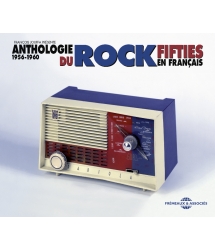
HENRI SALVADOR, JEAN YANNE, MAGALI NOEL, EDDIE...
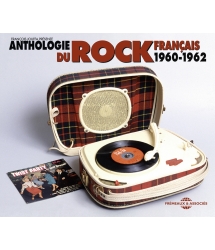
EDDY MITCHELL, JOHNNY HALLYDAY, DICK RIVERS…
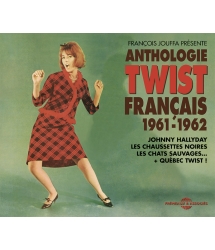
JOHNNY HALLYDAY • LES CHAUSSETTES NOIRES • LES CHATS...



-
PisteTitreArtiste principalAuteurDuréeEnregistré en
-
1Lhomme à la motoEdith PiafJ. Leiber00:02:041955
-
2Black denim trousers and motorcycle bootsCheersJ. Leiber00:02:091955
-
3Tes pas tombé sur la têteMac KacR. Guidry00:02:151956
-
4See you later alligatorBill HaleyR. Guidry00:02:451956
-
5Rock a beatin boogieIrène McNeilBill Haley00:01:331957
-
6Rock-a-beatin boogieBill HaleyBill Haley00:02:191957
-
7La chanson dOrphéeDalidaVinicius de Moraes00:02:481959
-
8Manha de carnavalGilberto JoaoVinicius de Moraes00:02:481959
-
9Nouvelle vagueRichard AnthonyJ. Leiber00:02:321959
-
10Three cool catsThe CoastersJ. Leiber00:02:091959
-
11Souvenirs, souvenirsJohnny HallydayC. Coben00:02:101960
-
12souvenirsBarbara EvansC. Coben00:02:021959
-
13Kili watchJohnny HallydayG. Derse00:02:431960
-
14Kili watch 2CousinsG. Derse00:02:371960
-
15Tu parles tropChaussettes NoiresJ. Jones00:01:471961
-
16You talk too muchJo JonesJ. Jones00:02:361960
-
17Mon septième cielJohnny HallydayDixon00:01:561961
-
18Seven steps to loveSal MineoDixon00:02:111958
-
19Ma ptite amie est vacheChats SauvagesDemetrius00:01:541961
-
20Mean woman bluesElvis PresleyDemetrius00:02:161957
-
21Le jour JChats SauvagesB. Boss00:01:441961
-
22Ive got you (Where I want you)Bobby DossB. Boss00:02:161961
-
23Cherie oh! cherieChaussettes NoiresG. Kelly00:02:341961
-
24Oh! les fillesu001ePingouinsM. Robbins00:02:131962
-
25SugareeHank BallardM. Robbins00:02:531962
-
PisteTitreArtiste principalAuteurDuréeEnregistré en
-
1Mon amour oubliéJohnny HallydayPhil Spector00:02:001960
-
2oh!u001e whyTeddy BearsPhil Spector00:02:291959
-
3La bamba rockChaussettes Noires00:01:471961
-
4La bambaRitchie Valens00:02:061958
-
5Panne dessenceFrankie JordanJ.D. Loudermilk00:02:161961
-
6Out of gasFloyd RobinsonJ.D. Loudermilk00:02:061959
-
7Cest encore une sourisDanny Boy et ses PenitentsC. Reverberi00:02:021961
-
8Ciao ti diroA. CelentanoC. Reverberi00:02:381959
-
9Tu mets le feuPiratesJ. Hammer00:01:441961
-
10Great balls of fireJerry Lee LewisJ. Hammer00:01:511957
-
11Twist à Saint-TropezChats SauvagesA. Salvet00:01:451961
-
12Twist à Saint-Tropez 2G. Lafitte00:02:341961
-
13Twist TwistChats SauvagesPagano Loti00:02:061961
-
14Twist Twist 2ChakachasPagano Loti00:02:181961
-
15Oh! Baby tu me rends fouChats SauvagesC. Bennett00:01:301961
-
16Im in love with youC. BennettC. Bennett00:02:181961
-
17Nous quand on sembrasseJohnny HallydayR. Hargrave00:02:381961
-
18High school confidentialJerry Lee LewisR. Hargrave00:02:291958
-
19Veille bien sur mon amourRichard AnthonyC. King00:02:121961
-
20Take good care of my babyBobby VeeC. King00:02:271961
-
21SantianoHugues AufrayD. Fisher00:02:131961
-
22Santiano 2HighwaymenD. Fisher00:02:081961
-
23Belles, belles, bellesu001eClaude FrançoisP. Everly00:02:131962
-
24Girls, girls, girls (made to love)Eddie HodgesP. Everly00:02:261962
-
25Girls, girls, girls (made to love) 2The Everly BrothersP. Everly00:02:011960
-
PisteTitreArtiste principalAuteurDuréeEnregistré en
-
1Serre la main dun fouJohnny HallydaySingleton00:02:431962
-
2Shake the hand of a foolTitus TurnerSingleton00:02:031961
-
3Et bien, cherche!PingouinsJ. Leiber00:02:351962
-
4SearchinThe CoastersJ. Leiber00:02:401957
-
5Be bop boogie boyVautoursG. Vincent00:01:451962
-
6Be bop boogie boyGene VincentG. Vincent00:01:481958
-
7Je suis près de toiRockersCrompton00:02:011962
-
8So whatJohnny KiddCrompton00:02:251961
-
9Vingtième étageEl Toro et Les CyclonesFairchild00:01:401962
-
10Twenty flight rockEddie CochranFairchild00:01:441957
-
11Ma verte prairieChris LongA. Schroeder00:02:311962
-
12Evergreen treeCliff RichardA. Schroeder00:02:401960
-
13Oh! Oh! CheriFrançoise HardyB.L. Trammell00:02:191962
-
14Uh! Oh!B.L. TrammellB.L. Trammell00:02:261958
-
15Le lion est mort ce soirHenri SalvadorP. Campbell00:02:431962
-
16The lion sleeps tonight (Wimoweh)TokensP. Campbell00:02:401961
-
17Jackie la guitareJackie MoulièreLee Hazlewood00:02:241962
-
18(Dance with the) the guitar manEddy DuaneLee Hazlewood00:02:411962
-
19Je suis né pour pleurerJose SalcyD. Dimuci00:02:141962
-
20(I was) born to cryDionD. Dimuci00:02:251962
-
21Jirai pleurer sous la pluieRichard AnthonyH. Greenfield00:02:001962
-
22Cryin in the rainThe Everly BrothersH. Greenfield00:01:571962
-
23Jentends siffler le trainRichard AnthonyE. West00:03:201962
-
24Jentends siffler le train 2Hugues AufrayE. West00:02:501962
-
25500 milesJourneymenE. West00:03:111961
Fa5669 Yéyé
François Jouffa présente
Yéyé VO/VF
VERSIONS ORIGINALES ET VERSIONS FRANÇAISES
DE La Naissance du Yéyé 1955-1962
ORIGINAL AND DUBBED EARLY FRENCH POP ROCK RECORDS, 1955-1962
La Naissance du Yéyé VO / VF
1955-1962
Par Pierre Layani et François Jouffa
Dans les grands clichés liés à la musique rock-pop française des années 60 (que certains appellent yéyé), figure l’attribut de comporter beaucoup de reprises, ou adaptations. Comme pour tous les clichés, il y a du vrai – vu de loin – et du caricatural – à y regarder de plus près. Car, de fait, c’est vrai… mais comme dans le monde entier ; à cette époque ; et dans ce genre musical !
Traditionnellement, dans le cadre d’une musique de genre, dont on s’inspire, que l’on revendique, que l’on transmet, la reprise est intrinsèque. Au moins dans un premier temps. Rock’n’roll, blues, rhythm’n’blues, country, folk(lore), rive gauche en sont les parfaits exemples. Sans parler du jazz, de la musique classique ou de l’opéra, où rarissimes sont les créateurs contemporains. Ainsi ces prestigieux chefs d’orchestre philharmoniques, qui se contentent de reproduire des partitions de siècles passés, se gardant surtout d’apporter la moindre note personnelle ! On re-re-re joue ce que l’on aime. Comme au théâtre où l’on reprend Molière, Racine, Shakespeare, Tchékhov, Feydeau…
Dans le cours d’une gestation musicale personnelle, au moment de devenir artiste, le réflexe est naturel d’entonner ses modèles, célèbres ou non, écoutés durant les années formatives, ceux qui ont déclenché la vocation. Elvis Presley, les Beatles, Rolling Stones, Bob Dylan ont commencé par chanter les chansons des autres. Et comment pour Johnny Hallyday ne pas démarrer par Elvis Presley (Tutti Frutti), les Chaussettes Noires avec Gene Vincent (Be-Bop-A-Lula) ou les Chats Sauvages par encore Elvis (Mean Woman Blues, méconnaissable en Ma p’tite amie est vache) ? Et si la langue est différente, c’est juste qu’un phénomène a traversé les frontières.
ADAPT’
Mais surtout, pour revenir au cliché ancien, dans le cadre d’époques de moindre documentation, certaines choses ne pouvaient pas être devinées vues de France. Ainsi la pratique des maisons de disques hexagonales était de sous-titrer une chanson de son intitulé original dans le cas d’une autre langue. Ce qui a accrédité cette idée de reprises de masse envers des créateurs patentés. Faute d’en savoir plus.
Mais, avec le recul, il s’est avéré que beaucoup de ces originaux étaient eux-mêmes des reprises ! Sauf dans le cas de chansons signées Richard Penniman (si on sait qu’il s’agit de Little Richard !), Chuck Berry…, plus tard Lennon-McCartney ou Jagger-Richards, qui en Europe connaissait dans les années 60 les vrais créateurs de That’s All Right Mama, Good Rockin’ Tonight, Mystery Train popularisés par Elvis Presley par exemple ? Autre exemple, l’Anglais Cliff Richard, abondamment adapté en France, notamment par les Chats Sauvages, dont on a découvert récemment, au fur et à mesure, qu’une partie de ces originaux étaient eux-mêmes des reprises supra-obscures d’origine américaine.
Ainsi, de nombreux standards intangibles, associés immédiatement à un artiste, ne sont-ils, après exégèse, que des reprises : Just A Gigolo (Louis Prima), Rock Around The Clock (Bill Haley), Whole Lotta Shakin’ Goin’ On (Jerry Lee Lewis), Blueberry Hill (Fats Domino), Hound Dog, Love Me Tender, It’s Now Or Never (Elvis Presley), La Bamba (Ritchie Valens), Georgia On My Mind (Ray Charles), Twist And Shout (Beatles), The House Of The Rising Sun (Animals), Go Now (Moody Blues), Hey Joe (Jimi Hendrix)… Voir encore Blue Suede Shoes, Tutti Frutti (Elvis Presley), Carol, Route 66 (Rolling Stones), With A Little Help From My Friends (Joe Cocker)… La liste est infinie.
Ainsi, hors musiques de film, le répertoire d’Elvis Presley, de la première à la dernière chanson, est composé au moins de trois quarts de reprises, comme chez Frank Sinatra ou Ray Charles. A quasi 100% chez Jerry Lee Lewis. Mais avec souvent des morceaux obscurs, inconnus vus de France. D’où le lieu commun du style : Johnny, il a fait beaucoup d’adapt’, mais Elvis, c’est ses chansons à lui ! Ce qui n’enlève, bien sûr, rien aux accrédités popularisateurs : ils ont fait la chanson ! Quitte pour l’approfondisseur à distinguer ensuite version originale et version de référence.
TWISTE & CHANTE
A celui qui reprocherait, sur le principe, le droit de Sylvie Vartan à endosser Twist And Shout par les Beatles (Twiste et chante), que répondre ? Que c’est la reprise d’un succès du groupe américain les Isley Brothers, lui-même transposé des infortunés créateurs les Top Notes… le morceau étant intégralement calqué sur un air du folklore mexicain : La Bamba !
Ou à Claude François, avec Si j’avais un marteau, de cogner derrière Trini Lopez et son If I Had A Hammer… déjà interprété par Peter, Paul & Mary… après le créateur sous-hit-paradisé Pete Seeger.
Ou encore à Johnny Hallyday de courir derrière Hey Joe, un air lui aussi du folklore, déjà interprété dans le giron rock par une demi-douzaine d’artistes-groupes avant Jimi Hendrix. Et dont la version – certes de référence – de ce dernier est somme toute très proche de la précédente par Tim Rose. Et sans l’apport du grand texte pour le moins brélien de Gilles Thibaut pour Johnny (…qui donnera lui-même lieu à Hey Max, par les Charlots !).
SUCCÈS…
Les motivations dans le choix de s’adonner à la reprise sont nombreuses. Lesquelles peuvent se confondre.
Comme nous l’avons vu, il y a la quête d’authenticité, de renvoi de balle à ses référents. Ainsi le 30 cm Les rocks les plus terribles de Johnny Hallyday, en 1964, de reprises non pas de tubes mais de standards.
On trouve aussi tenter de populariser un contemporain vu au départ comme difficile, tel Bob Dylan, comme l’a fait en France l’album Aufray chante Dylan, ou aux Etats-Unis Joan Baez, Peter, Paul & Mary, les Byrds. Tout comme ici maints interprètes à l’endroit de Georges Brassens, Léo Ferré, Serge Gainsbourg.
Cela peut être l’occasion de s’évader de son univers habituel. Ainsi Edith Piaf avec L’homme à la moto en 1955. Ou de s’immerger dans une ambiance bien particulière tel Claude Nougaro avec Armstrong d’après le traditionnel gospel Go Down Moses, ou Hugues Aufray avec maints airs fleurant le voyage et les antipodes.
Il ne faut pas négliger – bien sûr – la recherche du succès facile : ce qui a été N°1 ailleurs le sera en France ! Les deux champions de cette pratique de facilité sont Richard Anthony – précurseur – et Claude François (plus Dalida à ses débuts). Alors même que leur notoriété est à un moment de nature à aimanter tous les auteurs-compositeurs de la place, elle leur octroie en même temps une sorte de priorité auprès des éditeurs sur les succès étrangers. Et ils préfèrent souvent cette seconde solution, quel que soit le style du morceau, du moment que c’est un top-classé !
Mais parfois le cours des choses s’inverse. Ainsi – contre-cas ultime –, Claude François qui verra l’une de ses créations, Comme d’habitude, devenir l’un des plus grands standards internationaux (My Way). Et une autre de ses chansons, Parce que je t’aime mon enfant, être également reprise par Elvis Presley (My Boy).
… ET BIDES
Mais, comme pour tout ce qui relève du spectacle, et fait pour ainsi dire son charme, le rapport entre succès d’origine et succès de reprise est aléatoire. Les transpositions de She Loves You (Beatles, par les Chats Sauvages, Nancy Holloway) ou Satisfaction (Stones, par Eddy Mitchell) sont des bides. Mais les N°1 patentés, y compris en France, comme The House Of The Rising Sun (Animals) ou Black Is Black (Los Bravos) sont deux super-tubes pour Johnny Hallyday (Le pénitencier, Noir c’est noir).
A contrario le traditionnel américain 500 Miles, qui n’a jamais été un succès significatif pour ses nombreux interprètes, devient en France en 1962 l’un des plus gros cartons de la décennie via Richard Anthony et son J’entends siffler le train… alors que Hugues Aufray reste dans le strict anonymat avec le même titre au même moment.
Plus tard également le morceau inconnu Waterloo Road devient l’arc de triomphe de Joe Dassin en tant que Les Champs-Elysées.
Certains cas sont étonnants. Ainsi Sugaree, écrit par Marty Robbins, mais chanté notamment par Rusty York et Hank Ballard. Les Pingouins s’inspirent du premier pour Oh, les filles ! et les Chaussettes Noires du second pour Chérie oh chérie, personne ne se rendant compte sur le moment qu’il s’agit de la même chanson (et avec même un crédit de compositeur différent) !
A une époque où proposer une maquette finalisée à un artiste était peu fréquent, la reprise offre le confort du connu, par le fait que l’arrangement, l’ambiance, voir la façon de chanter sont déjà posés. Ceci avancé, le résultat final peut très bien osciller entre la copie conforme et la version très personnelle, voire méconnaissable. C’est le cas éminent des Chats Sauvages (Ma p’tite amie est vache, C’est le jour J, Est-ce que tu le sais, C’est pas sérieux…) et des autres groupes tels les Chaussettes Noires (Be bop a lula, Si seulement, Eddie sois bon, Je t’aime trop…), Pirates (Tu mets le feu) ou Pingouins (Cherche !). Selon le cas, jouées d’après les aptitudes propres ou avec une optique puriste guitare-basse-batterie, donc sans piano, guitare sèche voire saxophone, les versions sont transfigurées et se justifient magnifiquement.
Dans certains – rares – cas, un snobisme poussera même à la fausse adaptation, avec un sous-titre en anglais inventé ! Ainsi Richard Anthony (Non, je ne pourrais pas/Black Mood), Dick Rivers (Dans ma vallée/In My Valley). Ou jouant l’ambiguïté avec des pseudos d’auteur exotiques : Chariot (Petula Clark), La Longue Marche (Eddy Mitchell), signés J.W. Stole & Del Roma… alias Franck Pourcel & Paul Mauriat ! Ou encore chez Johnny Hallyday un sous-titre shakespearien alors que l’œuvre a été conçue spécialement pour lui par ses musiciens Micky Jones & Tommy Brown, certes anglais.
SON/SENS
Autre cliché, celui de l’édulcoration des textes de base américains rock’n’roll. Sauf exception, nous ne sommes pas dans le cadre d’une chanson à texte. Ainsi, l’auteur français qui arriverait à édulcorer le sens profond de Be-Bop-A-Lula, Tutti Frutti, Bama Lama Bamaloo, Hey-Hey-Hey-Hey, B-I-Bickey-Bi, Bo-Bo-Go, Da Doo Ron Ron, Twist And Shout (littéralement twiste et crie) mériterait d’entrer directement à l’Académie française ! Autrement dit sans vote.
En matière de rock, on peut distinguer deux façons de pratiquer l’adaptation. Celle basée sur le sens, qui ne recoupe pas forcément la sonorité d’origine ; et celle sur le son, qui ne suit pas automatiquement l’anglais dans le texte. Cas d’école : C’mon Everybody d’Eddie Cochran, qui donne le sonore Comment vas-tu mentir par Eddy Mitchell en 1963, et le littéral Venez tous avec moi par Johnny Hallyday en 1974, pas très heureux. Et, plus anecdotique, Shake, Rattle And Roll de Bill Halley endossé en Faire un chèque en bois c’est drôle par le facétieux Eddy ! Mais aussi ni l’un ni l’autre comme Au rythme et au blues par Johnny d’après Roll Over Beethoven de Chuck Berry.
Au tout début des années 60, la première grande source de reprise est Elvis Presley, venant ensuite Cliff Richard, Gene Vincent (spécialement pour les Chaussettes Noires), Ray Charles. En avançant dans la décennie, arrivent Chuck Berry, les Rolling Stones et surtout les Beatles.
Si la majorité des auteurs sacemisés sont signataires d’adaptations, tels Pierre Delanoë et Jacques Plante, les plus prolifiques sont Georges Aber, André Salvet et Ralph Bernet (qui se partage avec des créations). S’ils signent surtout des originaux, Jil & Jan, auteurs des débuts de Johnny Hallyday, sont particulièrement savoureux dans de rares transpositions, tels Elle est terrible (Somethin’ Else d’Eddie Cochran) ou La bagarre (Trouble d’Elvis), ou encore pour Vic Laurens C’est la vie (You Never Can Tell de Chuck Berry).
La pratique des adaptations s’amoindrira au milieu des années 60. D’une part avec l’arrivée d’une nouvelle génération autosuffisante (Nino Ferrer, Antoine, Michel Polnareff, Jacques Dutronc…), montrant même l’exemple à ceux de la précédente. De l’autre avec le succès direct, sans intermédiaire, des répertoires étrangers.
Mais l’abreuvement à certaines sources ne disparaîtra pas. Cela marquera même l’heure de la résurrection pour Eddy Mitchell avec en 1974 – à contre-courant cette fois ! – l’album Rocking in Nashville.
Pierre LAYANI
Juke Box Magazine
Production, directeur artistique : François Jouffa.
Compilation musicale : Pierre Layani.
Montage et mixage : Christophe Hénault, Art & Son Studio, Paris.
Documents et photos : collection Pierre Layani,
avec les archives de la Photothèque Rancurel.
Photo de couverture : © Roger Kasparian.
Merci à Jean-William Thoury, Jacques Leblanc, Christian Salset.
© FRÉMEAUX & ASSOCIÉS 2017
The Birth Of Yéyé, Original and Dubbed, 1955-1962
by Pierre Layani & François Jouffa
One of the great clichés tacked to the French rock-pop music of the Sixties — the style known as yéyé — is that the music contained a large number of reprises or adaptations. A careful look will tell you that, like all clichés, the statement has some truth in it (seen from a distance) but is also a caricature if you look more closely. Because in fact it was actually true… and for the whole world, not just France! Except that it was true then and for this genre of music!
In the course of a person’s own musical gestation, at the moment you become an artist, there’s a natural reflex to break into song like your models. They can be famous or not, but these are the models heard during your formative years, the ones who triggered your vocation. Elvis Presley, The Beatles, The Rolling Stones and Bob Dylan all began by singing the songs of others. So how could Johnny Hallyday not begin the same way, with Elvis Presley (Tutti Frutti)? Or the Chaussettes Noires with Gene Vincent (Be-Bop-A-Lula)? Or the Chats Sauvages with (again) Elvis (Mean Woman Blues, totally unrecognizable as Ma p’tite amie est vache)? And if the language is different, it’s just because a phenomenon crossed borders.
ADAPTATIONS?
Business-practise at French record-companies was to subtitle a song alongside its original title when that original was in another language. It lent substance to this notion of reprises en masse among obvious creators. When they didn’t know better.
But with hindsight it turned out that many of these “originals” were adaptations themselves. And, except for songs by Richard Penniman (unless you didn’t know it was Little Richard’s real name), or those by Chuck Berry — and later, Lennon-McCartney or Jagger-Richards —, who (in Sixties’ Europe) knew the real creators of That’s All Right Mama, Good Rockin’ Tonight or Mystery Train? Elvis Presley, for instance, made all of those songs popular. Another example is British singer Cliff Richard, who was abundantly adapted in France (notably by the Chats Sauvages.) With advances in investigation, it was recently revealed that some of those “originals” were in fact (very) obscure reprises originating in America.
After analysis, numerous intangible standards that had been immediately associated with one artist show themselves to be merely reprises: Just A Gigolo (Louis Prima), Rock Around The Clock (Bill Haley), Whole Lotta Shakin’ Goin’ On (Jerry Lee Lewis), Blueberry Hill (Fats Domino), Hound Dog, Love Me Tender, It’s Now Or Never (Elvis Presley), La Bamba (Ritchie Valens), Georgia On My Mind (Ray Charles), Twist And Shout (Beatles), The House Of The Rising Sun (Animals), Go Now (Moody Blues), Hey Joe (Jimi Hendrix)… Not to mention Blue Suede Shoes and Tutti Frutti (Elvis Presley), Carol and Route 66 (The Rolling Stones), or With A Little Help From My Friends (Joe Cocker). The list is endless. One result was that, apart from his film music, three-quarters of Elvis Presley’s repertoire — from the first song to the last — was made up of reprises, as was that of Frank Sinatra or Ray Charles. In the case of Jerry Lee Lewis, the figure is 100%!
“TWIST ET CHANTE”
What can you say in answer to the reproach made against Sylvie Vartan for picking up The Beatles’ Twist And Shout and calling the song Twiste et chante? Well, you might say that it’s the reprise of a hit by an American group called The Isley Brothers, itself transposed by those ill-fortuned creators known as The Top Notes… and that their piece was a carbon copy of the Mexican folk tune La Bamba!
HITS…
Many are the motivations behind choosing to indulge in a reprise. And they can be confused… One, as we’ve already seen, is the search for authenticity, for returning a favour to one’s references. This can provide an opportunity to escape from an artist’s usual universe. Take Edith Piaf, for instance, with L’homme à la moto in 1955...
Not to be neglected – of course – is the search for an easy hit: if the song has been a N°1 hit elsewhere, then it will be in France, too! The two champion practitioners of facility go by the names of Richard Anthony – a precursor – and Claude François (together with Dalida at her debuts). Just when their celebrity had reached a point when it was capable of attracting every songwriter in the business, it granted them, at the same time, a kind of priority with publishers who held the rights to foreign hits. And the former often preferred this second solution no matter what the style of the song, provided that it was at the top of the sales-charts!
But sometimes the course of events could be reversed: take the ultimate counter-argument, Claude François, who would see one of his own creations, Comme d’habitude, turn into one of the greatest international standards ever: My Way. And another of his songs, Parce que je t’aime mon enfant, would also be reprised by Elvis Presley as My Boy.
… AND FLOPS
But, as with all those things in the world of entertainment that contribute to its charm, the rapport between the success of the original and the success of its reprise is random. Material proof of this comes with the traditional American song 500 Miles, a song that never provided any of its numerous performers with major success. But it became one of the greatest hits of the decade in France, thanks to Richard Anthony who sang, J’entends siffler le train (yes, “500 Miles” had become “I can hear the train whistle”…)
Some cases are astonishing. Sugaree, for example, was penned by Marty Robbins but sung notably by Rusty York and Hank Ballard. The former provided the French group Les Pingouins with the inspiration for Oh, les filles!, and Ballard inspired the Chaussettes Noires’ song called Chérie oh chérie, but neither realised at the time that it was the same song (it was even credited to a different composer!)
In an age when proposing a finished demo-tape or “demonstration copy” to an artist was hardly frequent, the reprise had the comfort of being known, in that the arrangement, the atmosphere, and even the way it was sung, had already been laid down. This being the case, the final result could well oscillate between an accurate copy and a version that was highly personal, indeed unrecognizable. Depending on which of the latter the new versions actually were, and whether they were played according to the artists’ own abilities, or seen from a purist guitar-bass-drums angle (and therefore without piano, acoustic guitar or saxophone), the resulting versions could be transfigured and therefore magnificently justifiable.
SOUND/SENSE
Another cliché: the watering down of basic American rock ‘n’ roll lyrics. In most cases, the songs in this context are not literary works set to music. Where rock is concerned, one can make out two methods in which adaptation was practised: one based on meaning, which didn’t necessarily tie in with the sound of the original; and another, based on sound, which didn’t automatically follow the English lyrics in the initial song.
At the very beginning of the Sixties, the first major source for reprises was Elvis Presley, with Cliff Richard coming after, along with Gene Vincent (especially where the Chaussettes Noires were concerned), and Ray Charles. Going further into the decade we can find Chuck Berry, The Rolling Stones and, above all, The Beatles.
Whereas most of those officially registered as songwriters with the French copyrights’ society SACEM did put their names to adaptations — writers like Pierre Delanoë or Jacques Plante — the most prolific were Georges Aber, André Salvet and Ralph Bernet (with the latter also signing original works.) Jil & Jan, on the other hand, even if they wrote original songs above all (as Johnny Hallyday’s writers at his debuts), were a tandem that produced some particularly tasty lyrics in their rare transpositions, such as Elle est terrible (Eddie Cochran’s Somethin’ Else), La bagarre (Elvis’ song Trouble), or again the adaptation C’est la vie that they wrote for Vic Laurens (based on Chuck Berry’s You Never Can Tell).
The practice would gradually diminish towards the middle of the Sixties with, on the one hand, the arrival of a new generation of self-sufficient artists — Nino Ferrer, Antoine, Michel Polnareff, Jacques Dutronc — who even set an example for their elders, and, on the other hand, with the advent of more direct successes for foreign repertoire, which achieved hits without any intermediaries at all.
Pierre LAYANI
Juke Box Magazine
Adapted into English by Martin DAVIES
Produced for release by
François Jouffa.
Music selected by
Pierre Layani.
Edited and mixed by
Christophe Hénault, Art & Son Studio, Paris.
Documents and photos
Collection Pierre Layani with the archives
of the Rancurel photo library.
Front cover photography
© Roger Kasparian.
Thanks to Jean-William Thoury,
Jacques Leblanc, Christian Salset.
© Frémeaux & Associés 2017
DISCOGRAPHIE
DISQUE 1
ÉDITH PIAF
1 - L’homme à la moto (2’04)
J. Leiber-M. Stoller/ J. Dréjac 12/55
CHEERS
2 - Black Denim Trousers And Motorcycle Boots (2’09)
J. Leiber-M. Stoller 1955
MAC-KAC
3 - T’es pas tombé sur la tête (2’15)
R. Guidry/ F. Bonifay 05/56
BILL HALEY
4 - See You Later Alligator (2’45)
R. Guidry 01/56
IrÈne McNeil
5 - Rock A Beatin’ Boogie (1’33)
B. Haley 1957
BILL HALEY
6 - Rock-A-Beatin’ Boogie (2’19)
B. Haley 10/55
DALIDA
7 - La chanson d’Orphée (2’48)
A. de Moraes-L. Bonfa/ F. Llénas 07/59
JOÀO GILBERTO
8 - Manhà de Carnaval (2’48)
A. de Moraes-L. Bonfa 1959
RICHARD ANTHONY
9 - Nouvelle vague (2’32)
J. Leiber-M. Stoller/ A. Canfora-R. Anthony 10/59
COASTERS
10 - Three Cool Cats (2’09)
J. Leiber-M. Stoller 01/59
JOHNNY HALLYDAY
11 - Souvenirs, souvenirs (2’10)
C. Coben/ F. Bonifay 06/60
BARBARA EVANS
12 - Souvenirs (2’02)
C. Coben 1959
JOHNNY HALLYDAY
13 - Kili watch (2’43)
G. Derse/ Jil & Jan 11/60
COUSINS
14 - Kili watch (2’37)
G. Derse 1960
CHAUSSETTES NOIRES avec Eddy Mitchell
15 - Tu parles trop (1’47)
J. Jones-R. Hall/ G. Aber 01/61
JOE JONES
16 - You Talk Too Much (2’36)
J. Jones-R. Hall 1960
JOHNNY HALLYDAY
17 - Mon septième ciel (1’56)
Dixon-Wiener/ Jil & Jan 01/61
SAL MINEO
18 - Seven Steps To Love (2’11)
Dixon-Wiener 1958
CHAT SAUVAGES avec Dick Rivers
19 - Ma p’tite amie est vache (1’54)
C. DeMetrius/ P. Guitton 05/61
ELVIS PRESLEY
20 - Mean Woman Blues (2’16)
C. DeMetrius 1957
CHATS SAUVAGES avec Dick Rivers
21 - Le jour J (1’44)
B. Boss/ P. Saka 05/61
BOBBY DOSS
22 - I’ve Got You (Where I Want You) (2’16)
B. Doss 03/61
CHAUSSETTES NOIRES avec Eddy Mitchell
23 - Chérie oh chérie (2’34)
G. Kelly/ C. Moine 05/61
PINGOUINS avec Lou Vincent
24 - Oh, les filles ! (2’13)
M. Robbins/ E. Vartan 02/62
HANK BALLARD
25 - Sugaree (2’53)
M. Robbins
DISQUE 2
JOHNNY HALLYDAY
1 - Mon amour oublié (2’)
P. Spector/ C. Nicolas-G. Garvarentz 1960
TEDDY BEARS
2 - Oh ! Why (2’29)
P. Spector 1959
CHAUSSETTES NOIRES avec Eddy Mitchell
3 - La Bamba rock (1’47)
Adapt. J. Bouchéty 04/61
RITCHIE VALENS
4 - La Bamba (2’06)
Adapt. R. Valens 11/58
FRANKIE JORDAN & SYLVIE VARTAN
5 - Panne d’essence (2’16)
J.D. Loudermilk- G. Aber- D. Frank 05/61
FLOYD ROBINSON
6 - Out Of Gas (2’06)
J.D. Loudermilk 1959
DANNY BOY & SES PÉNITENTS
7 - C’est encore une souris (2’02)
C. Reverberi-Calabrese/ P. Louki 1961
ADRIANO CELENTANO
8 - Ciao ti diro (2’38)
C. Reverberi-Calabrese 1959
PIRATES avec Dany Logan
9 - Tu mets le feu (1’44)
J. Hammer-O. Blackwell/ P. Saka 09/61
JERRY LEE LEWIS
10 - Great Balls Of Fire (1’51)
J. Hammer-O. Blackwell 11/57
CHATS SAUVAGES avec Dick Rivers
11 - Twist à Saint-Tropez (1’45)
G. Lafitte-M. Solal/ A. Salvet 10/61
GUY LAFITTE
12 - Twist à Saint-Tropez (2’34)
G. Lafitte-M. Solal 10/61
CHATS SAUVAGES avec Dick Rivers
13 - Twist twist (2’06)
Pagano-Loti-T. Madinez/ M. Tézé 10/61
CHAKACHAS
14 - Twist twist (2’18)
Pagano-Loti-T. Madinez 10/61
CHATS SAUVAGES avec Dick Rivers
15 - Oh ! Baby tu me rends fou (1’30)
C. Bennett-R. Duke/ G. Aber 10/61
CLIFF BENNETT
16 - I’m In Love With You (2’18)
C. Bennett-R. Duke 07/61
JOHNNY HALLYDAY
17 - Nous, quand on s’embrasse (2’38)
R. Hargrave-J.L. Lewis/ Jil&Jan 09/61
JERRY LEE LEWIS
18 - High School Confidential (2’29)
R. Hargrave-J.L. Lewis 05/58
RICHARD ANTHONY
19 - Veille bien sur mon amour (2’12)
C. King-G. Goffin/ P. Delanoë 1961
BOBBY VEE
20 - Take Good Care Of My Baby (2’27)
C. King-G. Goffin 08/61
HUGUES AUFRAY
21 - Santiano (2’13)
D. Fisher/ J. Plante 12/61
HIGHWAYMEN
22 - Santiano (2’08)
D. Fisher 1961
CLAUDE FRANÇOIS
23 - Belles ! Belles ! Belles ! (2’13)
P. Everly/ C. François- V. Buggy 10/62
EDDIE HODGES
24 - Girls, Girls, Girls
(Made To Love) (2’26)
P. Everly 1962
EVERLY BROTHERS
25 - Girls, Girls, Girls (Made To Love) (2’01)
P. Everly 10/60
DISQUE 3
JOHNNY HALLYDAY
1 - Serre la main d’un fou (2’43)
M. Singleton/ Jil&Jan 05/62
TITUS TURNER
2 - Shake The Hand Of A Fool (2’03)
M. Singleton 1961
PINGOUINS avec Lou Vincent
3 - Et bien, cherche ! (2’35)
J. Leiber-M. Stoller/ G. Vesta 04/62
COASTERS
4 - Searchin’ (2’40)
J. Leiber-M. Stoller 03/57
VAUTOURS avec Vic Laurens
5 - Be bop boogie boy (1’45)
G. Vincent/ J. Plante 1962
GENE VINCENT
6 - Be Bop Boogie Boy (1’48)
G. Vincent 11/58
ROCKERS
7 - Je suis près de toi (2’01)
Crompton-Jones/ David 1962
JOHNNY KIDD
8 - So What (2’25)
Crompton-Jones 09/61
EL TORO & LES CYCLONES
(guitare : Jacques Dutronc)
9 - Vingtième étage (1’40)
Fairchild-E. Cochran 1962
EDDIE COCHRAN
10 - Twenty Flight Rock (1’44)
Fairchild-E. Cochran 1957
LONG CHRIS
11 - Ma verte prairie (2’31)
A. Schroeder-W. Gold/ G. Vesta-H. Kubnick 1962
CLIFF RICHARD
12 - Evergreen Tree (2’40)
A. Schroeder-W. Gold 1960
FRANÇOISE HARDY
13 - Oh oh chéri (2’19)
B.L. Trammell/ Jil&Jan 06/62
BOBBY LEE TRAMMELL
14 - Uh Oh (2’26)
B.L. Trammell 1958
HENRI SALVADOR
15 - Le lion est mort ce soir (2’43)
P. Campbell-H. Peretti-L. Creatore-G. Weiss-A. Stanton/ H. Salvador 1962
TOKENS
16 - The Lion Sleeps Tonight (Wimoweh) (2’40)
P. Campbell-H. Peretti-L. Creatore-G. Weiss-A. Stanton 1961
JACKY MOULIÈRE
17 - Jackie la Guitare (2’24)
L. Hazlewood-D. Eddy/ H. Salvador 1962
DUANE EDDY
18 - (Dance With The) The Guitar Man (2’41)
L. Hazlewood-D. Eddy 09/62
JOSÉ SALCY
19 - Je suis né pour pleurer (2’14)
D. DiMuci/ J. Salcy 1962
DION
20 - (I Was) Born To Cry (2’25)
D. DiMuci 1962
RICHARD ANTHONY
21 - J’irai pleurer sous la pluie (2’)
H. Greenfield-C. King/ R. Anthony 1962
EVERLY BROTHERS
22 - Cryin’ In The Rain (1’57)
H. Greenfield-C. King 1962
RICHARD ANTHONY
23 - J’entends siffler le train (3’20)
E. West/ J. Plante 1962
HUGUES AUFRAY
24 - J’entends siffler le train (2’50)
E. West/ J. Plante 06/62
JOURNEYMEN
25 - 500 Miles (3’11)
E. West 1961
Même si cela avait démarré dès la fin des années 50, l’apparition du rock en France en 1960-61, importé des Etats-Unis, instaure une pratique courante de la reprise, ou adaptation. Johnny Hallyday, Richard Anthony, Sylvie Vartan et tous les groupes de rock se plient à cet exercice. Mais le N°1 américain n’est pas forcément N°1 français, et vice-versa. Et certaines versions sont transfigurées, presque des re-créations, et n’en dégagent que plus de saveur. En voici un panorama sur 3 CD, qui de 1955 à 1962 met en perspectives les titres principalement américains et français, avec des VO quasi-inconnues, réalisé par François Jouffa et Pierre Layani.
Patrick Frémeaux
Even if they already existed before the end of the Fifties, French imports of American rock soon gave rise to the common practise known as a “reprise” or adaptation, an exercise that had many adepts including Johnny Hallyday, Richard Anthony and Sylvie Vartan, and all the rock groups. But being “N°1 in America” didn’t necessarily produce a French N°1, or vice versa, and some of the reprises were transfigured to become practically new inventions, and they were all the tastier for it. This 3CD overview taking in the years 1955-1962 puts mostly American and French titles in perspective thanks to some almost totally unknown original versions, selected here by François Jouffa and Pierre Layani. Patrick Frémeaux
CD 1 : 1 - ÉDITH PIAF L’homme à la moto (2’04) • 2 - CHEERS Black Denim Trousers And Motorcycle Boots (2’09) • 3 - MAC-KAC T’es pas tombé sur la tête (2’15) • 4 - BILL HALEY See You Later Alligator (2’45) • 5 - IrÈne McNeil Rock A Beatin’ Boogie (1’33) • 6 - BILL HALEY Rock-A-Beatin’ Boogie (2’19) • 7 - DALIDA La chanson d’Orphée (2’48) • 8 - JOÀO GILBERTO Manhà de Carnaval (2’48) • 9 - RICHARD ANTHONY Nouvelle vague (2’32) • 10 - COASTERS Three Cool Cats (2’09) • 11 - JOHNNY HALLYDAY Souvenirs, souvenirs (2’10) • 12 - BARBARA EVANS Souvenirs (2’02) • 13 - JOHNNY HALLYDAY Kili watch (2’43) • 14 - COUSINS Kili watch (2’37) • 15 - CHAUSSETTES NOIRES avec Eddy Mitchell Tu parles trop (1’47) • 16 - JOE JONES You Talk Too Much (2’36) • 17 - JOHNNY HALLYDAY Mon septième ciel (1’56) • 18 - SAL MINEO Seven Steps To Love (2’11) • 19 - CHAT SAUVAGES avec Dick Rivers Ma p’tite amie est vache (1’54) • 20 - ELVIS PRESLEY Mean Woman Blues (2’16) • 21 - CHATS SAUVAGES avec Dick Rivers Le jour J (1’44) • 22 - BOBBY DOSS I’ve Got You (Where I Want You) (2’16) • 23 - CHAUSSETTES NOIRES avec Eddy Mitchell Chérie oh chérie (2’34) • 24 - PINGOUINS avec Lou Vincent Oh, les filles ! (2’13) • 25 - HANK BALLARD Sugaree (2’53).
CD 2 : 1- JOHNNY HALLYDAY Mon amour oublié (2’) • 2 - TEDDY BEARS Oh ! Why (2’29) • 3 - CHAUSSETTES NOIRES avec Eddy Mitchell La Bamba rock (1’47) • 4- RITCHIE VALENS La Bamba (2’06) • 5 - FRANKIE JORDAN & SYLVIE VARTAN Panne d’essence (2’16) • 6 - FLOYD ROBINSON Out Of Gas (2’06) • 7 - DANNY BOY & SES PÉNITENTS C’est encore une souris (2’02) • 8 - ADRIANO CELENTANO Ciao ti diro (2’38) • 9 - PIRATES avec Dany Logan Tu mets le feu (1’44) • 10 - JERRY LEE LEWIS Great Balls Of Fire (1’51) • 11- CHATS SAUVAGES avec Dick Rivers Twist à Saint-Tropez (1’45) • 12 - GUY LAFITTE Twist à Saint-Tropez (2’34) • 13 - CHATS SAUVAGES avec Dick Rivers Twist twist (2’06) • 14 - CHAKACHAS Twist twist (2’18) • 15 - CHATS SAUVAGES avec Dick Rivers Oh ! Baby tu me rends fou (1’30) • 16 - CLIFF BENNETT I’m In Love With You (2’18) • 17 - JOHNNY HALLYDAY Nous, quand on s’embrasse (2’38) • 18 - JERRY LEE LEWIS High School Confidential (2’29) • 19 - RICHARD ANTHONY Veille bien sur mon amour (2’12) • 20 - BOBBY VEE Take Good Care Of My Baby (2’27) • 21 - HUGUES AUFRAY Santiano (2’13) • • 22 - HIGHWAYMEN Santiano (2’08) • 23 - CLAUDE FRANÇOIS Belles ! Belles ! Belles ! (2’13) • 24 - EDDIE HODGES Girls, Girls, Girls (Made To Love) (2’26) • 25 - EVERLY BROTHERS Girls, Girls, Girls (Made To Love) (2’01).
CD 3 : 1 - JOHNNY HALLYDAY Serre la main d’un fou (2’43) • 2 - TITUS TURNER Shake The Hand Of A Fool (2’03) • 3 - PINGOUINS avec Lou Vincent Et bien, cherche ! (2’35) • 4 - COASTERS Searchin’ (2’40) • 5 - VAUTOURS avec Vic Laurens Be bop boogie boy (1’45) • 6 - GENE VINCENT Be Bop Boogie Boy (1’48) • 7 - ROCKERS Je suis près de toi (2’01) • 8 - JOHNNY KIDD So What (2’25) • 9 - EL TORO & LES CYCLONES (guitare : Jacques Dutronc) Vingtième étage (1’40) • 10 - EDDIE COCHRAN Twenty Flight Rock (1’44) • 11 - LONG CHRIS Ma verte prairie (2’31) • 12 - CLIFF RICHARD Evergreen Tree (2’40) • 13 - FRANÇOISE HARDY Oh oh chéri (2’19) • 14 - BOBBY LEE TRAMMELL Uh Oh (2’26) • 15 - HENRI SALVADOR Le lion est mort ce soir (2’43) • 16 - TOKENS The Lion Sleeps Tonight (Wimoweh) (2’40) • 17 - JACKY MOULIÈRE Jackie la Guitare (2’24) • 18 - DUANE EDDY (Dance With The) The Guitar Man (2’41) • 19 - JOSÉ SALCY Je suis né pour pleurer (2’14) • 20 - DION (I Was) Born To Cry (2’25) • 21 - RICHARD ANTHONY J’irai pleurer sous la pluie (2’) • 22 - EVERLY BROTHERS Cryin’ In The Rain (1’57) • 23 - RICHARD ANTHONY J’entends siffler le train (3’20) • 24 - HUGUES AUFRAY J’entends siffler le train (2’50) • 25 - JOURNEYMEN 500 Miles (3’11).

